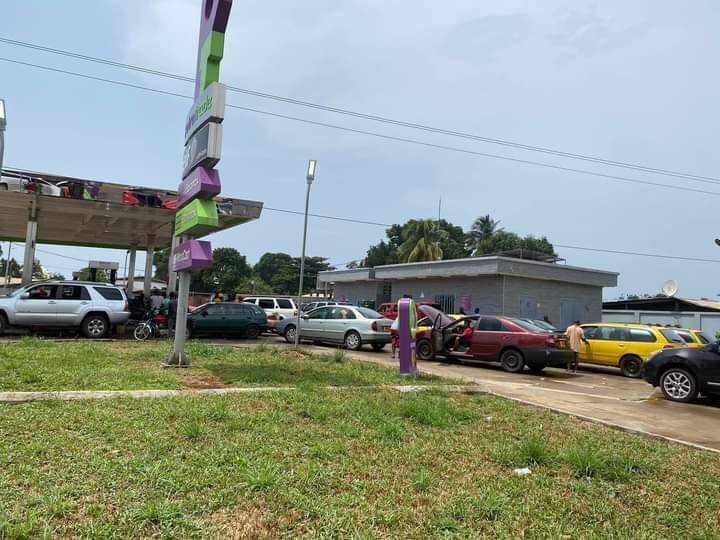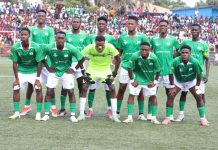
Africa-Press – Liberia. The abrupt and surreptitious increase in the price of gasoline is said to be paralyzing normal working and commercial activities and imposing severe hardship on Liberians, bulk of who live in extreme poverty.
Last week, Liberians woke up to news of a hike in the price of gasoline on the local market from L$620 (US$4) to between L$1000 (US$6.4) and L$1200 (US$7.7) for a gallon in some areas.
Drivers, riders and passengers are getting into commotion over transportation fares being charged, while unscrupulous business owners are capitalizing on the situation to enrich themselves to the detriment of others.
Transportation fares have greatly increased, affecting the prices of basic commodities on the local market and services being rendered by professionals.
Citizens, including passengers, commercial and private motorcyclists, drivers and riders have been venting out their anger, frustration and disappointment as a result of the increment in the price of the commodity.
Solomon Manobah, 42, is a commercial motorcyclist, father of three children and a wife, depends on commercial bike riding at the Samukai Town junction in the township of Caldwell, outside Monrovia.
Speaking in an exclusive interview with FrontPage Africa over the weekend, Manobah explained that the “shock” increase in the price of gasoline is imposing more hardship on him and his family members.
He expressed the fear that ahead of the commencement of the second semester for academic year 2021/2022, his children would not be in school, if the current situation of gasoline shortage persists.
He observed that earning money from fares being charged passengers has drastically reduced because, most passengers now prefer trekking than spending nearly twice the previous fares that were charged them to go to and move their respective destinations.
“We woke up this morning and went to the filling station, but we were surprised for them to say L$1000 for gallon. We are stay buying it because, we can’t allow our bike to be parked. When the bike is parked, the children and I, who standing here will not eat too. Since this morning, I have not even make L$500, only L$200 in my bag now. Before gas price could go up, I have made around L$1500 by this time”.
Passengers complaining
Most often, drivers of commercial motorcycles, tricycles and vehicles engaged into the exchange of words, invectives and sometimes engage into fistfight over unstable transportation fares being charged across Monrovia and other parts of Liberia.
The setting and subsequent enforcement of transportation fares by the Government of Liberia (GOL), through its relevant ministries and agencies has been an aged-old problem in post-conflict Liberia.
At times, cosmetic joint statement is issued by the Ministries of Transport, and Commerce detailing transportation fares to and from various destinations, but nothing has been done by authorities of these entities to ensure that drivers and riders adhere to the fares issued.
Manobah indicated that the current situation is causing confusion between commercial motorcyclists and some passengers.
“The passengers are getting angry with us; but when I explain the situation to them, some of them can understand, but some of them cannot understand at all. The distance I used to take for L$100 and if I tell a passenger ‘because of the situation that I am going through, I am taking the L$100 distance for L$150. Some of them can ask, what the problem is and we can tell them”.
Calling us criminals
Commercial drivers and motorcyclists are increasing the transportation fares by between 30 to 40% as a result of the hike.
But the decision taken by them to unilaterally increase fares without any official statement from the government continues to serve and create room for misunderstanding and confusion among them and their respective passengers.
They are being called all sorts of names by some passengers.
“Some of our passengers can call us criminals, zogos and all kinds of names because we are charging them extra money because of the gas price. Some of them are aware that the gas price has gone up, but they still see us as ones that are stealing from them”, Albert Manneh stated.
He continued” We too are doing business and you can’t do business to lose. We want to make profit to sustain our families too. And so, we will charge them extra money that they can afford too to pay. They should be able to reason with us too”.
Selling gas at nights
Daniel Rogers, 25, purchased a gallon of gasoline for L$850 (US$5.5) last Thursday morning. But the next morning, he was constrained to pay the amount of L$1000(US$6.4).
He questioned the rationale behind the decision taken by some owners of filling stations to only sell their products during the night hours.
“If you go to the gas stations in the day, they will say there is no gas. But the same gas station will be selling gas in the night. Where ever you see gas seller selling gas at night, it is different intention. Go and check for yourself, all the gas stations around here closed now. You will see their pumps hanging and they will say no gas. But as soon it is 7PM, they will start selling”
Drop in revenue generation
Revenue generation for commercial drivers and motorcyclists has drastically decreased as a result of the increase in the price of gasoline in Liberia.
“Normally, I used to make between L$4000 (US$25.9) to L$5000 (US$32.4). But day before yesterday, I made L$3000, yesterday, I made L$2000. We are not getting passengers like before because, people are complaining. This is a serious problem we are facing” Rogers stated.
‘Walking by line’
‘Walking by line’ is a popular saying being used in Liberia to illustrate “trekking”. At times, citizens who cannot afford exorbitant transport fares make good use of their legs to ‘walk by line’ to and from their various destinations.
“If a passenger is going to a place and he supposed to pay L$50 and we are charging them L$100, they will not want to go with you again-they will prefer walking by line to go there than to but the L$100. Things are getting very hard,” Joseph Lepolu, 28, stated.
He continued: We just woke up and heard gas was being sold for that price. The first place I went, gas was L$800; I left and went another place and the price was L$1000. Before I could come back, the other guy who was selling for L$800, his gas finished and so, I was forced to buy gas LS1000 yesterday”.
Massa Dennis, 34, was seen trekking from Duala to Logan Town during the early afternoon hours. According to her, the decision was intended to “save money and reduce her transportation fare”.
“I can’t pay LS200 from here to Broad Street when there is no food even at my house at this time. I am walking a little bit to reach in front and get in kehkeh (tricycle). I think it’s about time that the government intervene and do something to address the sufferings we are going through every day”.
Marketers
Prices of basic commodities, including rice, cooking oil, among others have slightly increased as a result of the situation.
“I used to sell a bag of 25kg rice for about US$13.60, but the new rice I just bought and the transportation cost, I have increased the price to at least US$14 so I can drink cold water too”, Annie Williams, a petty trader on the Bushrod Island stated.
She continued: “If government does not do anything, everyone will have their own price and things will continue to get hard every day in Liberia. I can’t be buying rice US$13 for bag and come sell it the same price after I finished paying huge transportation. At the end of the day, we all know that the consumers are the ones to feel the weight”.
A lady, who preferred not to be named, told FrontPage Africa that she has also increased the prices of her fruits because of the increase in transportation fares.
“I bought these butter peas “avocados” from Bo Waterside. I paid a lot of money for transportation. I used to sell one of the big one for L$200. But I increased the price to L$300. People can be blaming us when they come buy; but I can just sit back and laugh. They expecting us to not make profit too? How will we feed our families?”
Open now or remain close forever
Alfred Mayson, 36, is a commercial driver and a father of four children, who admitted that “business has move from bad to worse” for commercial drivers in Monrovia.
He wants the CDC led-administration to adopt what he called “amateur posture” to compel unscrupulous owners of various gas stations across the country to not discriminate in the sale of the product.
Years back, he recalled that similar posture was used by the government of former Liberian President Charles Ghankay Taylor, when owners of various gas stations attempted to create artificial shortage of the commodity.
Mayson claimed that some filling stations in Monrovia and other parts adjacent, are only serving customers with coupons, instead of those riding commercial vehicles, tricycles or motorbikes.
: “If you go to the station, you will see them serving other people. Some stations can only serve people who have coupons. We are all Liberians and have the same blood; but as soon it comes to gas shortage, they start to pick the sheep from the goat”.
He added: “Government should compel these people to sell gas to everyone. Government should check their various tanks to make sure they have gasoline. If they closed their filling stations because there is no gas, government should make sure to check and if gasoline is found in the tank, that station should remain close forever”.
Citizens will adopt
Ernest Wisseh, 38, is a local trader of gasoline in Caldwell. Over the week end, he was the only one selling gasoline at the reasonable price of L$800 for gallon.
As a result of his reasonable price, commercial motorcyclists and drivers trooped in to purchase until he ran out of supply.
He observed that owners of some local filling stations are engaged into hoarding the product by creating artificial shortage.
But despite their decision, Wisseh observed, that Liberians will adapt to the increment even though they are going through tough times.
He claimed that those hiking the price of gasoline are “spoiling the names of other honest sellers” of the commodity on the local market.
“I have a problem with people selling the gas higher price because it is the ordinary people that will suffer the most. From here to Caldwell junction used to be L$100 dollars, but I heard people saying it is now L$150. Passengers who do not understand are having issues with the kehkeh riders. If you go to the big stations around here, they are having gas. But others will go there and buy to take it to their gas stations and sell at a higher price. For me, I don’t support that”.
“I been doing this business from 2017 to present; it is what I am living on and so, I don’t like to put something inside that is not perfect or will affect me. I bought my gas few days ago and I am selling mine for L$800. Others are selling for L$1000, but I don’t know where they got their gas from and I am not move by that. My price is reasonable and so, people do not question it”.
Pleas to government, gas stations owners
The citizens, including drivers and commercial motorcyclists want the government come up with stringent measures to prevent unscrupulous business owners from creating an artificial shortage of the commodity.
They want armed security personnel to be assigned at various gas stiation to effectively effectuate a policy statement to preventing artificial shortage of not only gasoline, but other basic commodities, including rice, oil, among others.
“We are appealing to government to ensure that the people who get the gas should put it outside. We all are citizens and we should know how to treat one another”, Solomon Manobah.
Since the inception of the Coalition for Democratic Change (CDC) led government of President George Manneh Weah, vast majority of Liberians continue to experience tough times as a result of a shattered economy, lack of job opportunities and low wages being paid to civil servants and others in both the public and private sectors.
The government has not been robust in responsively responding to the plights confronting the ordinary citizens.
It has been accused of consistently turning“blind eye and downplaying” concerns raised by citizens on pertinent issues which have the proclivity of affecting their livelihood.
With the latest hike in the price of gasoline on the local market, citizens and other foreign residents may abandon their scheduled plans to visit family members, friends, loved ones and others as a result of exorbitant fares being charged for transportation.
Others who are frequently doing so may reduce or cut down their visitations if they have to save money to cater to them or their respective family members.
Though others, especially government officials, are going about their normal routines due to their financial strength, the ordinary Liberians, including those in the leeward areas and slum dwellers are the ones that are gretly feeling the pinch from the increase in the price of gasoline in Liberia.
If nothing is done urgently to address the current situation, things will fall apart and move from bad to worse between travellers and commercial drivers and motorcyclists across the country as commotion, fistfight that may likely lead to deaths or injuries could be the order of the day in the nation.
For More News And Analysis About Liberia Follow Africa-Press





